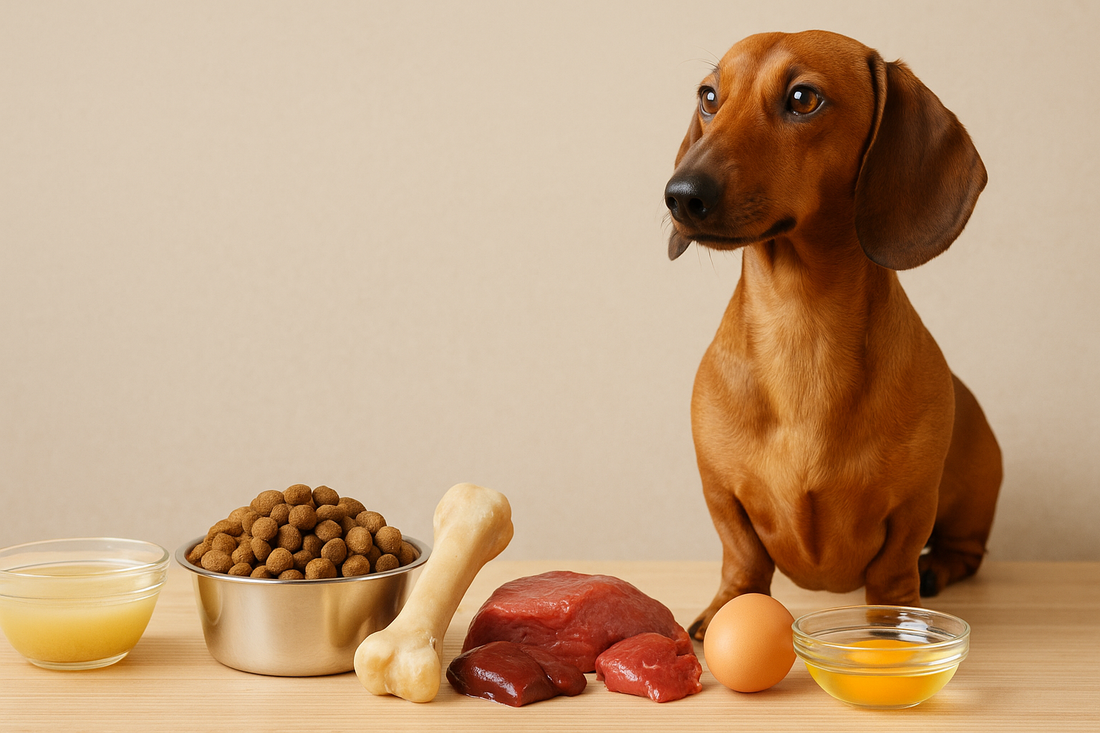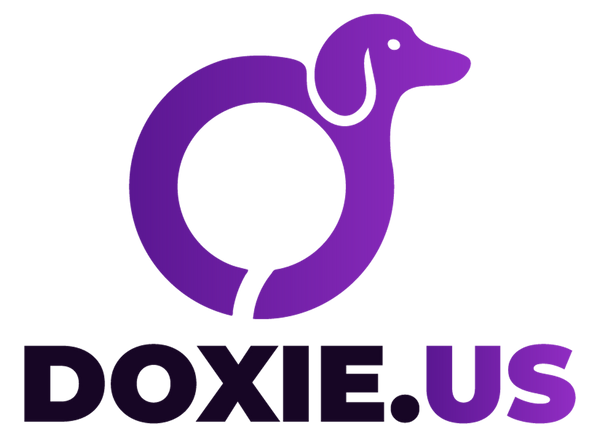
What Type of Food Will Help My Dachshund Develop Strong Bones?
Compartir
If you’re a devoted Dachshund parent, you already know how much your little long-bodied, short-legged companion loves to romp, explore, and snuggle. But with that lovable shape comes unique skeletal stress: those extra-long backs and relatively short limbs put added emphasis on bone and joint health. So when it comes to helping your Dachshund build and maintain strong bones, proper nutrition is a key part of your care plan.
Here we’ll dive into what foods and nutrients support bone development in Dachshunds, what to look out for, and how to implement changes safely. Let’s get your wiener-dog’s foundations as strong as their personality!
Listen on Spotify
Why Bone Health Matters for Dachshunds
The Dachshund’s distinctive build — long spine, short legs — means their bones and joints — especially the back and hips — carry particular loads. While many bone issues are breed- and genetics-driven, nutrition can play a significant role in giving your dog the best chance to maintain strong skeletal structure.
Emerging research shows that correct levels of minerals — especially calcium and phosphorus — and the right ratio of those minerals, are essential for healthy skeletal development.
Likewise, bone health isn’t just about growth; adults benefit too from nutrition that supports mineral maintenance, joint resilience and avoiding undue stress on the skeleton.
For Dachshunds in particular, diet advice from breed-specific welfare groups highlights that formulas tailored for the breed often have “an adapted calcium and phosphorus content to help aid bones and joints.
DachFeast™ Dachshund Food Bowls – Ergonomically elevated feeder with dual stainless-steel bowls and adjustable height. (link: doxie.us/products/dachshund-food-bowls) Dachshund Shop
Why it fits: Helps reduce neck strain and improve digestion — which supports overall body health and allows nutrient absorption for bones.
How to mention: “Using the right bowl height helps your Dachshund eat comfortably, promoting better nutrient uptake (like calcium and phosphorus) that feed bone health.”
Tip: Suggest placing a small toppers of organ meat or cooked egg in these bowls (per your nutrient-rich foods section) to boost bone-support nutrients.
What Nutrients Are Key to Strong Bones?
1. Calcium & Phosphorus
- These two minerals make up the primary mineral structure of bone. The diet must not only provide adequate amounts but also the correct ratio of calcium to phosphorus (generally around 1:1 to 2:1) for optimal bone formation.
- Over- or under-supply can be harmful. For example, the development of rickets or other bone deformities results from improper levels.
- For Dachshunds, you’ll want to choose a complete diet that has these minerals balanced for a small-breed, long-bodied dog.
2. High-Quality Animal Protein
Bone is living tissue: it remodels and repairs. Your Dachshund’s diet should deliver enough high-quality protein (amino acids) to support bone matrix, muscle support, and overall structural health. Poor protein can compromise formation.
Also, some breed-specific diet guides recommend a “moderately high percentage of protein … with a relatively low water percentage” to ensure nutrient density.
3. Vitamin D & Other Micronutrients
Vitamin D facilitates calcium absorption and proper mineralization of bone. Without it, calcium can’t be effectively used.
Other nutrients like magnesium, zinc, and trace minerals also play roles, though calcium, phosphorus and vitamin D are the major players in bone health.
4. Healthy Fatty Acids & Mobility Support
While perhaps less obvious, omega-3 fatty acids (DHA/EPA) and other joint-supportive nutrients help maintain healthy joints — which in turn reduce stress on bones. Some Dachshund diet advice specifically mentions the benefit of adding Omega 3s for links to bone & joint health.
5. Appropriate Energy Intake and Body Weight
Bones must support the weight they carry. Over-feeding, or rapid growth (in puppies) places excess strain on the skeleton. One article emphasises that “excess energy intake leads to an animal being acutely overweight … which places an additional burden on the growing skeleton.”
For adult Dachshunds, keeping them lean and muscular helps their bones and spine for decades.
Specific Food Types & Feeding Ideas for Dachshunds
Taking cues from the approach in the French Bulldog article (but adapted for Dachshunds), here are food types and feeding tips to include:
✔ Quality complete dog food formulated for Dachshunds or small-breeds:
Look for diets that state “bone & joint support” or similar, and ensure the calcium/phosphorus levels are indicated or marketed for long-bodied breeds. For example, the breed-specific formula Royal Canin Dachshund mentions “appropriately adapted calcium and phosphorus levels … to help support tiny limbs and a long backbone.”
✔ Bone broth as a supplement/topper:
Just as the Frenchie article suggests bone broth for French Bulldogs, you can add a little bone broth (unsalted, lightly prepared) over meals for your Dachshund. It can provide natural minerals, help hydration and flavour, and support appetite and digestion.
✔ Offal/organs (in moderated amounts):
Organs such as liver, kidney, heart are nutrient-dense and can support bone/metabolic health. They provide bio-available vitamins and minerals. The Frenchie article mentions “kidneys, heart, liver … nutrients and necessary minerals for bone growth.” frenchie Shop
For Dachshunds, you can incorporate small amounts of high-quality organ meat (preferably from a trusted source) as part of a varied diet.
✔ Eggs:
Eggs are a complete protein with many nutrients, easy to digest and a nice boost. The Frenchie article says eggs are “a nutrient powerhouse… will improve their bones … aid them in growing denser bones faster.
For adult Dachshunds, you might crack a cooked egg into their meal occasionally (ensuring it’s safe and well-cooked).
✔ Raw/Primal feeding toppers (with caution):
Some raw feeding guides for Dachshunds emphasise “Bone – rich in calcium, phosphorus, and structural minerals for strong bones and joints.”
If you go this route, ensure you maintain the correct mineral balance (especially Ca:P ratio) — otherwise you risk deficiencies or excesses. As one source warns, “many homemade diets for dogs are deficient in minerals and fail to achieve a proper calcium-to-phosphorus ratio.
PawElevate Dachshund Anti‑Slip Pet Stairs – A specialized set of pet stairs for Dachshunds, designed to reduce back/joint strain. (link: doxie.us/products/pawelevate-dachshund-anti-slip-pet-stairs) Dachshund Shop
Why it fits: While not a food product, this supports skeletal health by reducing impact and strain on your Dachshund’s long back and joints — complementing your bone-health diet advice.
How to mention: In your blog you can include a “Lifestyle Tip” or “Beyond Nutrition” section: “To protect your Dachshund’s bones and spine, pair the right diet with body-friendly furniture and equipment like the PawElevate stairs, so that your long-bodied buddy doesn’t have to jump down from the bed/furniture.
Feeding Tips & Best Practices ✅
Choose complete & balanced commercial diets wherever possible. These are formulated to meet nutrient needs safely (including mineral ratios).
Check labels for calcium and phosphorus (if available), and look for statements specific to bone & joint health or small/long-bodied breeds.
Avoid over-feeding, especially for Dachshunds: excess weight strains the back and bones. Monitor body condition and keep to recommended calorie intake.
Transition diets gradually when changing foods or adding new toppers (e.g., bone broth or eggs) to avoid digestive upset.
Provide regular, appropriate exercise, which encourages healthy bone modeling and joint function — but avoid high-impact jumps or extremes that stress the spine or limbs.
Consult your veterinarian before giving supplements, especially calcium or phosphorus, or starting a homemade/raw diet.
Watch for signs of bone/joint trouble, such as reluctance to move, difficulty rising, changes in gait, or back/hind-leg weakness — these warrant medical check-up.
What to Avoid & Things to Watch ⚠️
Don’t assume “more is better” for calcium. Excess calcium (especially without correct phosphorus) can also lead to bone/joint disorders.
Avoid foods with vague nutrient profiles, cheap fillers, or diets not suitable for long-bodied breeds.
Homemade diets without professional formulation: Unless you’re working with a veterinary nutritionist, homemade recipes can easily fall short of correct mineral ratios and nutrients.
Excess rapid growth (for puppies): While Dachshunds are small breed and mature faster than giants, the principle remains that overly rapid growth + imbalanced nutrition increases risk of developmental skeletal disorders.
High-impact physical strain: Even the best diet can’t fully offset structural strain if your Dachshund is repeatedly jumping from heights, twisting the spine, or carrying excess weight.
Sample Feeding Strategy for a Dachshund
Here’s a practical sample plan (adjust volumes according to your dog’s size, age, activity level, and vet’s recommendation):
Morning: Quality small-breed formulated kibble with bone & joint support.
Afternoon/Evening: Same kibble portion + a small topper such as 1 tsp bone broth or ¼ cooked egg (depending on dog size).
Weekly: Replace one meal with a fresh food mix (e.g., lean cooked organ meat + vegetables) to vary nutrients and provide natural mineral sources.
Treats: Use low-calorie treats or vegetable chewables; avoid over-feeding.
Regular weight/condition checks: Ensure your Dachshund remains at healthy body condition (not overweight, ribs easily felt, waist visible from above).
Veterinary check-ups: At growth milestones (puppy to adult) and for any mobility/back concerns; ask the vet to review diet and bone/joint status.
Final Thoughts
Nutrition is one of the most powerful tools you have to support your Dachshund’s bone health — and when paired with gentle, appropriate exercise, a healthy body weight, and breed-aware care, you can help your long-bodied buddy enjoy many active, comfortable years.
Focusing on quality food, correct calcium-phosphorus balance, enough high-quality protein, and no excess calories will do much of the heavy lifting. Think of the diet as the foundation — strong bones grow from strong foundations.
Give your Dachshund the right fuel, keep the weight down, and the backbone strong — and you’ll be setting them up for a long, joyful, healthy trot. 🐾
Related Articles
- Why Every Doxie Needs a Dachshund Car Safety Bed
- 10-Minute Guide to Starting a Dachshund Toothbrushing Habit
- How to Build Dog Ramps & Stairs for Dachshund
👉 For more helpful Dachshund care tips and product guides, visit our Doxie Blog!
